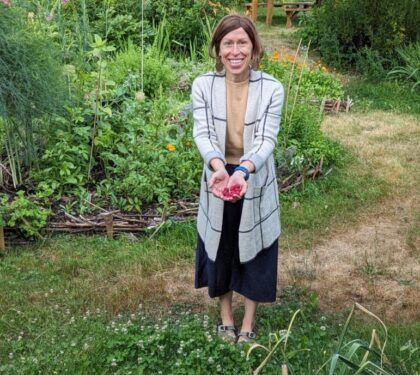Supporting the Viability of a Boise Refugee Farmer
On a quiet residential street near the airport in central Boise, Idaho, you will find a little more than four acres of farmland nestled in between homes. My colleague, Idaho Program Manager David Anderson, and I arrived on a cool summer morning to meet with one of the many farmers that share the space, Abdi Haji of Umoja Na Uhuru (“Unity and Freedom”) World Farm.
Abdi has been growing his operation with support from a local nonprofit, Global Gardens, since 2006. Of Somali Bantu origin, Abdi grew staple storage crops such as sesame, corn, and sunflower prior to moving to the United States. Today, he operates a Community Supported Agriculture program that provides fresh vegetables for 26 families in the Boise area. Additionally, Abdi accepts online orders and sells at Boise’s Saturday Market, offering sweet corn, beets, potatoes, sugar snap peas, squash, peppers, leafy greens, tomatillos, and more.
Over the years, this Boise farmer has implemented changes on his farm to become more efficient in time and water usage. In 2022, he received a Brighter Future Fund grant from the American Farmland Trust. This grant allowed him to continue upgrading his farm by investing in multiple pieces of equipment that allow for faster hand tilling, precision seeding, and lettuce harvesting. The remaining funds will be used to install drip irrigation and plastic sheeting, which conserve water through reduced evaporation.
Looking ahead, Abdi plans to expand his farm footprint, eventually growing on two-to-three acres. “[Having] one place, that will be helpful for me,” he says. “[Managing multiple small plots] takes too much time and too much management. So, if I have flat land like this, even two acres, three acres is enough for me. I’ll stay there… and I can grow everything.”
Farmland Access Challenging in Idaho
A challenge for Abdi is finding land in Boise’s ever-growing urban footprint. This Boise farmer‘s family, community, and customers all live in the area, so he is motivated to stay close. But Idaho, like the rest of the United States, is losing farmland at a rapid pace. According to AFT’s Farms Under Threat research, if residential and commercial development continues “business as usual,” Idaho will lose an additional 113,000 acres of farmland by 2040.
Around 35% of those acres are projected to be lost in Ada County, where Boise is located, and in neighboring Canyon County. Boise farmers looking to purchase land often cannot compete with developer prices and struggle to grow their businesses.
One bright note for small-scale urban farmers, like Abdi, is Boise’s recent decision to rewrite a city zoning code with the aim of increasing affordable housing, reducing traffic congestion, and preserving Boise’s remaining open spaces.
As Idaho Program Manager David Anderson noted in one of the city’s zoning code rewrite hearings, “continuing [with current development trends] as usual will develop almost two square miles of farmland each year in Ada County, but building a better city will reduce development pressure on neighboring farmland by up to 50%.”
The Modern Zoning Code, which passed in June 2023, will maximize growth in Boise’s urban core, in theory, allowing rural and urban farmers to stay closer to markets and community, while still operating their businesses.
As for now, Abdi will continue farming on this piece of shared farmland within Boise’s city limits, growing food for the community, and contributing to the local food system.
If you’re in the Boise area and have farmland that might be a good fit for new and beginning farmers like Abdi, contact Global Gardens: at [email protected] or (208)336-4222.




